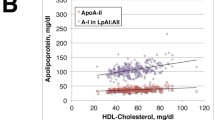Abstract.
Apolipoprotein H (apoH, protein; APOH, gene) is a 50-kDa glycoprotein that binds to negatively charged substrates, including phospholipids. ApoH is a main target antigen for the binding of antiphospholipid antibodies that are associated with thrombotic events. We have previously characterized the structural organization of the human APOH gene. Because of the significant structural homology between the human and chimpanzee genomes, we have employed oligonucleotides from the human APOH gene sequence to amplify chimpanzee DNA covering the entire transcribed region together with flanking sequence in the 5' region. As in humans, the chimpanzee APOH gene consists of eight exons and seven introns and encodes for a 326-amino-acid protein. The deduced amino acid and nucleotide sequence show 99.4% and 99.6% similarity between human and chimpanzee APOH, respectively. Using isoelectric focusing (IEF) and immunoblotting, we screened 155 chimpanzees (128 unrelated captured parents and 27 captive-born offspring) for the apoH protein polymorphism. The most common IEF pattern in chimpanzees was identical to a previously described APOH*3 allele in humans. In addition, an anodally shifted pattern was observed in chimpanzees with an allele frequency of 0.168, and the corresponding allele was designated as APOH*4. DNA sequencing of APOH*4 carriers revealed a missense mutation in exon 6 (A→G) at codon 210, which replaces the amino acid lysine by glutamic acid. This mutation does not affect the binding of apoH to cardiolipin as revealed by cardiolipin/enzyme-linked immunosorbent assay (ELISA). We also evaluated the prevalence of anti-apoH antibodies in chimpanzee plasma by using human-apoH-based ELISA and the association of the Lys210Glu mutation with the occurrence of anti-apoH antibodies. The prevalence of anti-apoH antibodies in chimpanzees (64%) was found to be unusually high compared with that found in humans. However, the Lys210Glu mutation showed no association with the occurrence of anti-apoH antibodies. The prevalence of anti-apoH antibodies in chimpanzees may serve as a useful animal model for the human antiphospholipid syndrome, where these antibodies are associated with clinical manifestations.
Similar content being viewed by others
Author information
Authors and Affiliations
Additional information
Electronic Publication
Rights and permissions
About this article
Cite this article
Sanghera, D., Nestlerode, C., Ferrell, R. et al. Chimpanzee apolipoprotein H (β2-glycoprotein I): report on the gene structure, a common polymorphism, and a high prevalence of antiphospholipid antibodies. Hum Genet 109, 63–72 (2001). https://doi.org/10.1007/s004390100549
Received:
Accepted:
Published:
Issue Date:
DOI: https://doi.org/10.1007/s004390100549




